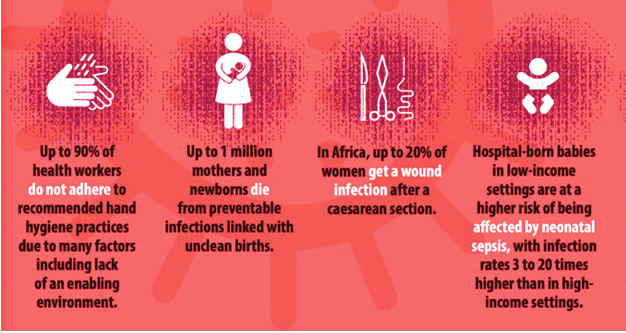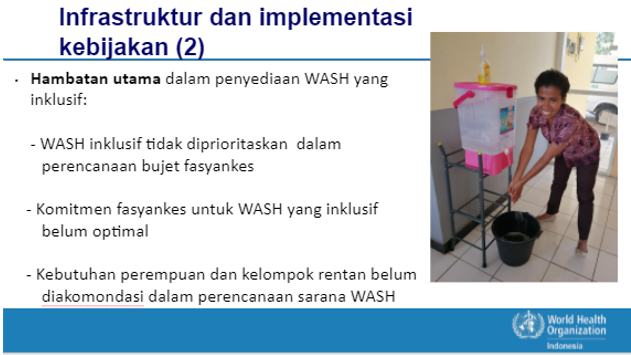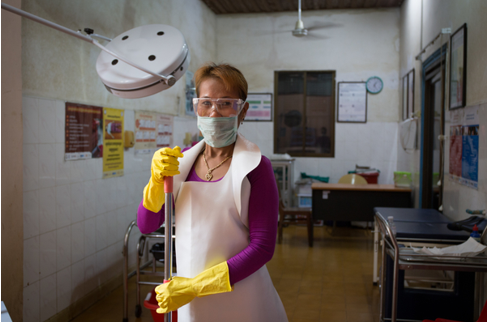Availability, accessibility, acceptability and quality of water sanitation and hygiene (WASH) services in healthcare facilities is critical to improve patient safety and quality of care. The Ministry of Health, with support from WHO, is currently developing a national roadmap for WASH in Community Health Centers (Peta Jalan Air, Sanitasi, Higiene, & Pengelolaan Limbah di Puskesmas Tahun 2021-2030) to further that objective. There are seven strategic objectives in the roadmap which relate to policy and regulation, human resources for quality services, research and development, facility and infrastructure, community engagement, resilience and sustainability and monitoring-evaluation. The national roadmap will integrate gender equality and social inclusion aspects to address the specific WASH needs of women and vulnerable population, prevent stigma and discrimination, and ensure that no one is left behind in access to WASH in healthcare facilities.
On 18, 21 and 22 October 2021, WHO organized and led a series of virtual focus group discussions (FGDs) with key stakeholders to gather perspectives on the specific WASH needs of women and vulnerable populations in healthcare facilities. The FGDs also explored both the challenges faced and promising practices in addressing those needs. The recommendations from the discussions will inform the development of the national road map on WASH in healthcare facilities.

Fig. 1. Global situation of poor access to WASH in healthcare facilities. Source: Global Progress Report on WASH in Healthcare Facilities, WHO and UNICEF, 2020.
Women’s perspectives are critical in WASH improvement efforts. Women are the main users of health services and the primary caregivers for family members. They have unique needs around the time of menstruation, pregnancy and childbirth. Therefore, the burden of poor WASH in healthcare facilities (HCF) falls disproportionately on women. WHO estimates that globally, up to 1 million mothers and newborns die from preventable infections linked with unclean births. Further, hospital-born babies in low-income settings are at a significantly higher risk of being affected by neonatal sepsis. Inadequate WASH infrastructure and poor hygiene practices in HCF may also prevent women from seeking care.
Furthermore, the WASH needs of vulnerable groups, such as people with disabilities, older persons and children are often overlooked, and they may face physical, institutional and social barriers when accessing WASH in HCF. WASH services that are not inclusive for these groups could increase their risk of healthcare associated infections and injury and reduce their healthcare utilization.
Those needs were discussed in depth in the series of FGDs. On 18 October, the FGD started with five selected Puskesmas in East Nusa Tenggara province. Heads of puskesmas, healthcare workers, sanitarians and cleaning staff participated in the discussion. On 19 October, the discussion continued with civil society organizations (CSOs) and development partners who work with WASH, women’s rights, children’s rights and the rights of the people with disabilities in different provinces in Indonesia. Finally, on 20 October, the discussion concluded with a session with the Ministry of Health that explored the Ministry’s policies and practices in integrating gender and social inclusion in their programmes.

Fig. 2. WHO presented on improving WASH and achieving equalities in healthcare facilities. Credit: WHO Indonesia and Getty Images/RF212192006
Lessons learned from the FGDs revealed gaps in awareness, infrastructure and policies for inclusive and gender-equal WASH. While there is already awareness of the importance of, for example, inclusive toilets, it is not always addressed in the budget planning processes of healthcare facilities. Further, WASH could be improved by involving vulnerable groups more throughout the process, from participating in WASH assessments, to the development of improvement plans, their implementation, and monitoring of WASH services in healthcare facilities.

Fig. 3 Lessons learned from the focus group discussions revealed barriers in providing inclusive WASH services in healthcare facilities. Credit: WHO
CSOs and development partners shared some promising practices that could be replicated. These included inviting vulnerable groups as entrepreneurs to provide WASH infrastructure, organizing men’s groups to promote handwashing practices, and socialization of inclusive WASH services to healthcare facilities, including as part of the WHO-UNICEF WASH Facility Improvement Tool (WASH FIT) assessment.
Recommendations from the FGDs are as follows:
a. Policy and regulation
- Creating a specific mandate within the Ministry of Health to integrate gender equality and social inclusion in WASH in healthcare facilities
WHO shared these recommendations with health offices in selected districts in East Nusa Tenggara province, CSOs and development partners and Ministry of Health at a dissemination workshop on 29 October. The recommendations will help in the development of inclusive roadmap for WASH in healthcare facilities.
WASH in healthcare services for all in Indonesia programme has been made possible with the generous support of the Australian government.

Credit: WaterAid
